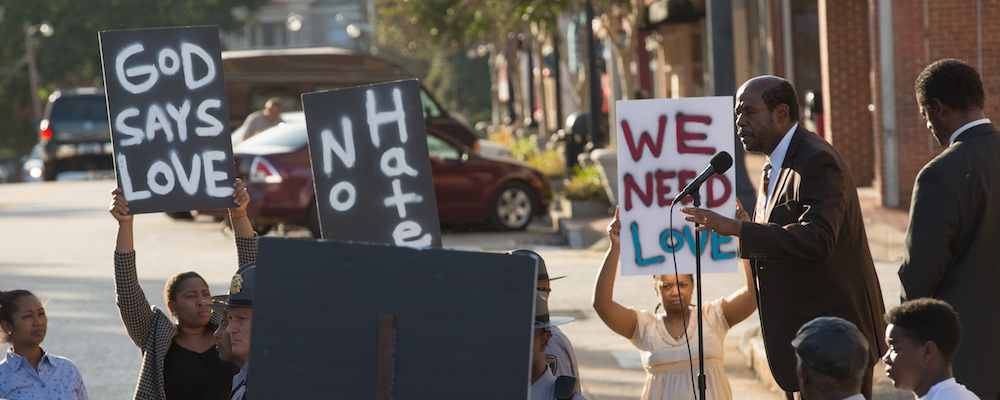Love Conquers Hate in Sundance Winner ‘Burden’
Sandra Miska
A dedicated racist who seems beyond redemption ultimately finds the courage to change and fight hate in Sundance winner “Burden,” a drama that tells the true story of Mike Burden (Garrett Hedlund), a white repo man whose decision to leave the Ku Klux Klan in 1996 ignited a firestorm in his small South Carolina town. The fallout from his exit led to a real-estate lawsuit; however, the focus of “Burden” is not so much on property and the law as it is on moving relationship between Mike and David Kennedy (Forest Whitaker), an African-American preacher who fights for the good in him.
When we first meet Mike, he is a repo man and vet whose life revolves around the Klan. Having lost his mother years earlier, he has found a surrogate father in Tom Griffin (Tom Wilkinson), the vile leader of the local Klan. The already heated race relations in their town reach a boiling point after Tom purchases an old theater and turns it into a KKK museum and “redneck store.” He gives the deed over to Mike in what outwardly is meant to be a fatherly gesture, but the more we get to know Mike, the more we realize that Tom dotes on him because he’s easy to manipulate. Long Tom’s faithful foot soldier, we see a shift in him when he starts falling for Judy (Andrea Riseborough), a local single mother who has no love for the Klan. As they grow closer, she does what she can to persuade him to rethink his relationship with Tom, eventually issuing him an ultimatum.
So deep runs Tom and the Klan’s hold on their town that Mike and Judy soon find themselves both unemployed and homeless along with Judy’s young son, Franklin (Taylor Gregory). In an incredibly short amount of time they find themselves begging for change, and this is when Rev. Kennedy spots them, buys them food, and in a remarkable act of generosity, takes them in. His wife (Crystal Fox) and son (Dexter Darden) think he’s insane, but he sees Mike’s leaving the Klan and their crossing paths as a sign that fuels his drive to make peace amongst the blacks and whites in town.
As warm and fuzzy as some of this sounds, writer and director Andrew Heckler doesn’t shy away from showing the ugliness of hatred, and Mike is truly despicable in the beginning, doing things like urinating on a random African-American woman from his truck, beating a young black man to a pulp after he vandalizes the KKK museum, and even almost shooting Kennedy on Tom’s orders, the latter leading to his breaking point. As remarkable as Mike’s eventual renunciation of hate is, even more extraordinary is Kennedy’s refusal to give up on him, even after he proves not to be an easy person to advocate for. If he stops trying to help Mike, he can no longer call himself a preacher, he says to his wife in a powerful moment.
At the end, “Burden” explores not only racism, but also the different ways in which emotional pain manifests in people. Although Mike’s past isn’t explored as adequately as it could have been, we do know that he has been let down by his biological father and his country, and has turned his trauma into rage. Kennedy, meanwhile, has had to deal with the fact that his uncle was lynched, and he has channeled his grief and pain into his faith and his quest for peace. Heckler also does a decent job of making the case that no one is beyond forgiveness.
While “Burden” tells an inspiring story involving a preacher without coming off as overly preachy, the screenplay isn’t the tightest. Usher Raymond gives a decent performance as Clarence, Mike’s childhood friend who is also the father of Franklin’s best friend, but he doesn’t get enough time on screen and his character is sadly underdeveloped.
“Burden” opens Feb. 28 in select theaters.

